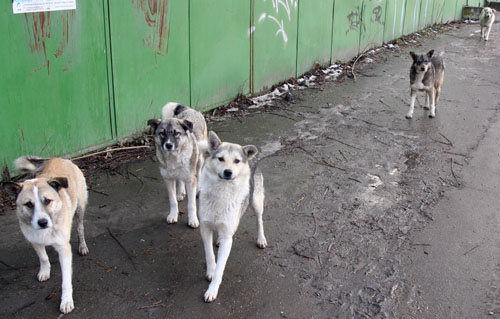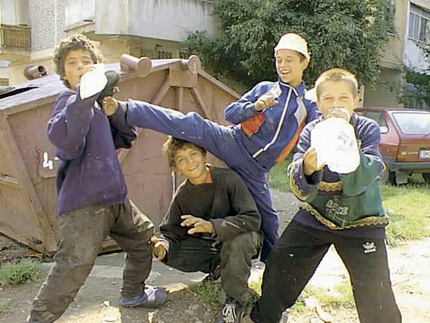
Since 1990 I have been back to Romania often, as my parents and friends are still there. These visits have been difficult. The first time I brought my husband there, in 1994, we were followed by Securitate, and one guard, who offered to be our guide in the mountain town of Sinaia. The guard actually pulled his gun out and started complaining how, being a crappy Romanian gun, it could go off suddenly. Many provincial Romanians considered me a slut for having a foreigner with me. My husband felt stressed to the point that when we headed back toward Italy we stopped in a hospital in Vienna.
Two years later, we visited just after the first non-Communist (Constantinescu) was elected as head of state, and it seemed things were changing. The city was cleaning up; more foreign companies were coming. The shelves were restocked, the atmosphere felt less oppressive and there was hope and some rebuilding.
And yet, within a few short years this hope was dashed. The old communist leaders mobilized and defeated him; it was clear that Contantinescu never had a chance to change much, as the ultimate power was still wielded by the same old crowd.
They had changed their label but -- as the expression heard in the recent US political scene went -- you can put lipstick on a pig but it's still a pig. Until 2004, in many ways very little changed. Capitalism was introduced, but it was feral and rampant. If you had money you could travel and the airport was refurbished and expanded, and international corporations set up shop and hired people. Young people learned English and how to use computers. But in many ways the worst of the West was being adopted. The Romanian language itself seemed to deteriorate, turning into a mockery of itself. Many young people seemed driven by nothing but money. Shopping became the main ambition of gold digging young girls, looking to catch rich, foreign businessmen with fancy cars and luxury apartments. Meanwhile a burgeoning population of abandoned children flooded the streets, many living underground in the sewers, addicted to sniffing glue known as Aurelac.
Initially, after the changes in 1990, real estate was cheap, but among Romanians the only ones with any money to invest were mainly ex-Securitate. Foreigners ready for the "Wild East" were not generally intellectuals or artists, but gangsters, hoods and legit but shrewd businessmen. The contracts to rebuild the city, highways and infrastructure were rife with corruption. Many construction projects never seemed to get finished, and streets that needed fixing would be dug up and left as work sites for years, literally.
And then there is the story of the stray dogs. After Ceausescu's insane plans razing neighborhoods and displacing tens of thousands of families, many animals were abandoned, and then they multiplied. With the lack of civil authority or civic sense, these dogs soon dominated the streets, numbering in the hundreds of thousands. Brigitte Bardot came to argue for sterilization and adoption programs to manage the problem, but her attempts were a drop in the bucket. The then mayor of Bucharest, later president, Basescu, tried to enact laws to reduce the numbers, and over the years these numbers did decrease. But stray dogs still remain today, wandering the streets sadly.

One Japanese businessman was parking his car one afternoon a few years ago in front of a major government building in the center of the capital. As he stepped out he was attacked by a stray dog, and bitten in the leg. Unfortunately the bite severed an artery, and he bled profusely on the sidewalk as locals stood and stared, and he was dead before the ambulance came. In the papers the next day the dog was renamed heroically, while the Japanese man, in spite of his position and influence, was blamed for trespassing on the dog's turf, and debates ensued in the mainstream media, giving this argument serious consideration, favoring it for the most part.
The street-kids phenomenon has not gone away either; the kids, many of whom die very young as a result of exposure, addiction and disease, are replaced by new generations of similarly unfortunate children, who by now have created a new form of language and culture, evolved underground.

In 2004 my father had a stroke and my husband and I moved to Bucharest, for what would end up being a ten-month stay.
For me it was a devastating experience. It seemed that some things hadn't changed, in fact if anything they had gotten worse. People seemed defensive and argumentative; it seemed impossible to give suggestions to anyone without fear of pissing them off. Though I have good friends there I found many rather depressed, defeated and unhealthy, some smoking like chimneys, others eating badly. They would complain about their workplace and the impossibilities of doing what they really wanted. They were almost universally cynical about their lives and the country; I found it terribly sad. Their sense of humor would occasionally cheer me up, but mostly it was quite dark.
Shopping was a horror show: stores were manned with aggressive grumpy people who barked at customers. If I opened the door for someone to be courteous, I never once got a thank you in return. At the crosswalks one didn't dare cross, presuming cars to stop; they wouldn't. In that environment if you have a car you have priority over the suckers who don't.
The sense of civic, civil society was utterly gone. In restaurants waiters were often surly and unhelpful, at times lingering around your table to overhear your conversations, making faces if you wanted something. We started creating a list of places we would never go back to; by the time we left, our options were reduced to a handful, as dozens had been struck off because of terrible experiences.
The worst thing however was the health care system. With my father in hospital I was obliged to experience it firsthand, and I saw horrors that still invade my dreams today. This is a subject that merits a thorough exposure, but let it suffice to say here that the system is utterly corrupt, and in my mind criminal. Bribery is widespread and accepted. If a person is unfortunate enough to end up in a hospital and doesn't have someone to bribe the doctor, nurses and assistants, that patient will be ignored, unfed, treated only superficially and perhaps even abused. I saw this with my own eyes.
When I asked friends for advice how to get around this corruption, I only received suggestions on who and how much to pay to get the best treatment. I had no choice but to comply, or my father would die. As it was, even with the payments, he recuperated in horrific conditions, and yet it was considered one of the best facilities in the country.
One nurse was particularly greedy and mean, so one day, after paying her off for some time, I decided not to give her another "tip". As a result she bruised my father intentionally administering an injection. When I visited him I saw the wounds; and though he could hardly speak, he told me how he got them. I informed the doctor -- there were those rare ones who were trying not to be corrupt and were serious about their work. But they couldn't do anything: there was no way to punish this nurse for her action, no authority to go to, no method to challenge the system without them risking their own positions. As a result many good doctors, the honest ones, fed up with the corruption, tend to escape and go work in other countries.
Twenty years on, things have surely changed. Had the system not collapsed around Europe, Iliescu and his gang would likely never have challenged Ceausescu and staged the fake revolution and I would very likely be dead by now, victim of a stroke or heart attack from the stress and pressure of daily life as it was. But, though products are on the shelves, cars on the streets, lights in the homes, and foreign money invested, in many ways the damage wrought by those years of repression and fear has not faded.
People are still defensive, depressive and stressed. The system of government is burdened by cronyism, corruption and crime. Many among the older generations feel defeated, hopeless, bitter and angry, their pensions worthless after years of devalued currency and significant inflation. Young people, representing the only possibility of change, face daunting challenges, and all too many are driven by money. When people don't have it, it becomes the end-all, and ethics and high ideals take a back seat.
That lovely hometown I grew up in today has crumbling, muddy streets; the homes are dilapidated, the parks overgrown and the aging population vastly unemployed. It is a dismal, gray and dirty place. The refinements of life, that existed in the mid-60's even under communism, seem like paradise compared to what exists today.
Romania was once a center for arts and culture, attracting the literati from Paris, and boasting artists of international repute. It is a culture, in spite of (or perhaps because of) its history of living under occupation that has produced great artists, musicians, writers and intellectuals. I am heartened by recent films produced in Romania, like Four Months, Three Weeks, Two Days. They show depth, understanding, artistry and soul. They have rightly been internationally acclaimed and bring pride to me, overjoyed to see Romania stand for something other than stray dogs and AIDS orphans living in misery. I truly hope it is a sign of the rebirth of creativity and is allowed and encouraged to grow.
I do not pine for the good old days nor am I expecting anything extraordinary to happen to make it all better. I only wish that the international media, as it celebrates these events of twenty years ago, would put things into honest perspective, and offer more than superficialities. The fall of the communist regimes shaped events for decades to come, and impacted millions of people. Though some things are clearly better, there are many who lived with jobs and dignity and now struggle on pennies in crumbling towns, who would argue about the benefits of the new capitalism. It is a complex world, with complex issues. The damage caused over decades in communist and post-communist Romania has left scars still visible today, evident in the lack of self-respect, trust and hope among the people, and the consequences of this are vast and will take a great deal of time, wisdom and courage to heal.